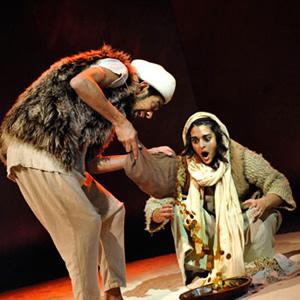An adaptation of a classic book for stage or screen is usually greeted with howls of protest from fans of the original over the omission of beloved passages or the spurious insertion of jarring modern dialogue. Not so with the RSC’s Arabian Nights. Dominic Cooke’s adaptation is much better than Richard Burton’s venerable translation of The Thousand And One Nights with its rambling, repetitious structure of stories within stories and endless unpronounceable Djinns and Ephrits. Cooke has harvested six of the best of Shahrazad’s tales and brought them to life in a blaze of light and joy with a fantastic ensemble cast, puppets, beautiful costumes, an original score and a simple, versatile set.
The best storytelling, on page or stage, creates a self-contained universe in which it is a pleasure to journey and a sorrow to leave. No fan of the great 19th century novels is a stranger to the sense of bereavement that accompanies closing the covers on friends with whom one has travelled so far and through so much. It is the same in the RSC’s Courtyard Theatre where even the foyer is bedecked with lamps and oil burners that might have come straight from the bazaars where so many of these stories were told and retold across the centuries. It is something of a comedown to have to say goodbye to vengeful King Shahrayar, Shahrazad, Dinarzad, the Vizier and the host of characters they conjure in the course of two and a half hours that culminate in the King’s redemption in a scene so moving it leaves you clapping through your tears.
The use of projectors, now almost ubiquitous in large scale productions, is conspicuous by its absence in Arabian Nights. Places, people, animals and even sound effects are created by the cast themselves in a simple but effective style that showcases the talents of the RSC company. Jane Leaney is particularly impressive as a horse in The Story Of The Wife Who Wouldn’t Eat and the carrion flies buzzing round the corpse of Ali Baba’s hapless brother in The Forty Thieves will set your stomach churning.
I really hope this production is revived next winter and, if it is, Ayesha Dharker’s captivating Shahrazad is reason enough to get tickets. If you don’t go then you are a bigger fool than Abu Hassan in How Abu Hassan Broke Wind.





